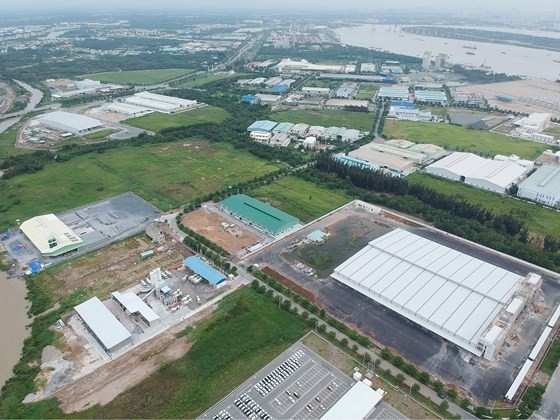
Lately, Vietnam generally and property sector particularly succeed in luring foreign investors thanks to sustainability of macroeconomic growth.
The Increase in foreign direct investment (FDI) plus the shift in investment have shown the enormous potential of the industrial real estate which is comprised of properties used for manufacturing and production: factories, plants. For instance, $35.6 billion FDI was poured into the segment in 2017, a year-on-year rise of 44.4 per cent.
A statictis report issued in the end of 2017 said that there were 220 industrial parks and export processing zones in the area of 69,000 hectares in the country. It is planned that the industrial land will double by the year 2020.
Industrial parks have had moves to appeal investors. Specifically, Hiep Phuoc Park in Nha Be district and Tan Thuan Park in district 7 have built high-rise factories to lure investors. Deputy Director of Linh Trung Export Processing Zone Tran Thien Trung said it has completed paper work to break ground of another high-rise factory this year.
Industrial parks and export processing zones have had preferential policies for investors like support for paper work, business certificates, land leasing formalities, recruitment consultation. Hiep Phuoc park also invested a section for Japanese investors in addition to operating a section for supporting industry.
2017 is considered a pivotal year for industrial production which lured $15.87 billion into manufacturing and processing accounting for 44.2 percent of total FDI.
Positive signs of FDI attraction in processing field is opening good opportunities for industrial real estate. Many manufacturing firms have continuously expanded their scale lately resulting in industrial real estate rise.
According to a survey of the Japan External Trade Organization (JETRO) in Ho Chi Minh City, nearly 70 percent of firms in the survey affirmed a plan to expand production in Vietnam meanwhile as per Eurocham’s statistic, over 90 percent of European firms will continue investing in Vietnam. The figure is highest compared to other nations in the Southeast Asia.
As per Savills Vietnam, the largest property consultancy in Vietnam with real estate services, industrial real estate market is in its early stage. Noticeably, in early 2018, the market has seen a landmark sale-and-leaseback transaction, the Vietnam-Singapore Industrial Park (VSIP) – a Vietnam and Singapore joint venture –which reflected a yield of 10.7 percent.
Economists also predicted that e-retail revenues in Asia-Pacific markets including Vietnam are projected to increase exponentially in short and medium term. Accordingly, demands of warehouses and automation technology will increase as per prediction. Besides, fast delivery and position also affect consumers’ decision.
FDI has made impact on industrial parks’ activities in HCMC, Hanoi, Bac NInh, Thanh Hoa which are leading in attracting investment. Additionally, investors are attracted by cheap Vietnamese skilled workers, proper rental offices and just 20 percent corporate income tax.
Troy Griffiths, Savills deputy managing director for Vietnam, said FDI in manufacturing from Japan, South Korea, Singapore and Thailand have flowed into Vietnam. In last months of the year, industrial real estate is most potential.
Jeffrey Perlman, Southeast Asia chief for Warburg Pincus, also said that the Southeast Asian nation has drawn global investors for its fast economic growth. In March, 2018, under an agreement with Becamex IDC , Warburg Pincus invested US$200 million in BW Industrial Development JSC, which will develop modern logistics and industrial properties in major industrial parks and economic zones across Vietnam.
With foreign investors’ transfer of factories from China to Vietnam plus rapid rise of domestic consumption, the time is ripe for drastic growth of Vietnam’s logistics and industrial real estate market.
























